When it comes to renovating the heart of your home, choosing the best wood floors for your kitchen is crucial. It needs to withstand heavy foot traffic, potential water damage, and daily wear.
If you are considering wood floors for your home, I’ll go over how to choose and the differences among the best wood floors for your kitchen.
This post may contain affiliate links.
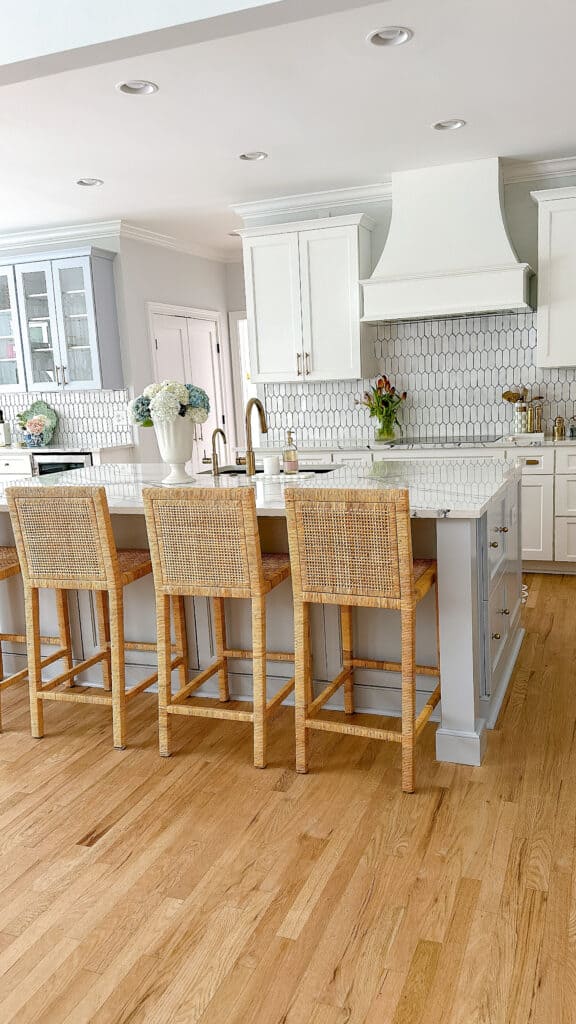
The Best Wood Floors For Your Kitchen & How To Choose
Wood flooring in a kitchen plays a significant role in the overall design style of the space. They are a popular choice for kitchens due to their warmth, durability, and timeless appeal.
Wood floors, however, are not created equal. There are several different types that have their pros and cons depending on your family’s needs.
Let’s dive into why hardwood kitchen floors might be the best wood flooring for your culinary space, what considerations you should have in mind, and the types of wood floors you might consider.
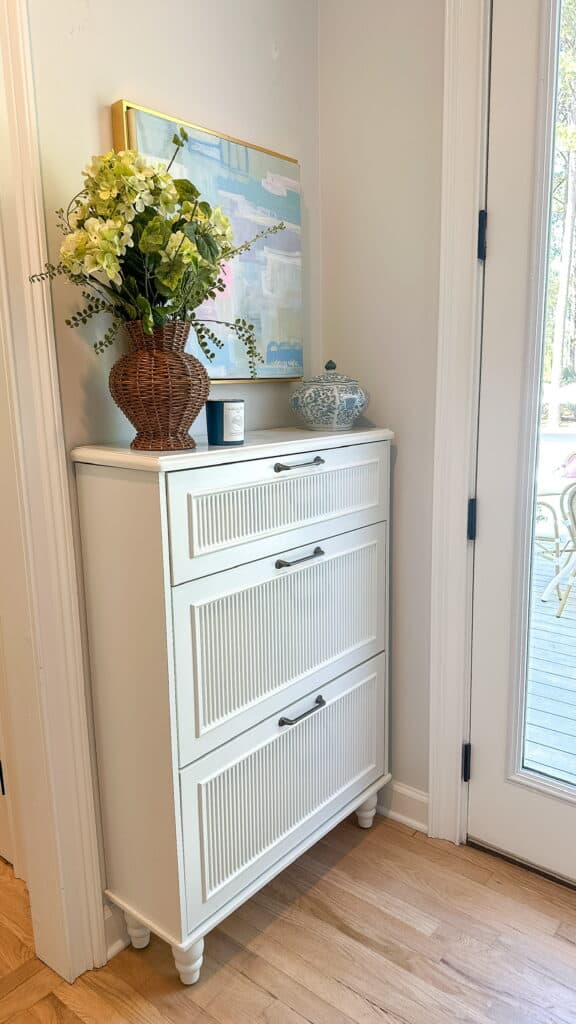
Benefits Of Wood Floors In The Kitchen
Wooden flooring adds a touch of elegance and a natural feel to any room of your home. The wood grain and rich colors of natural wood can complement both traditional kitchens and those with a more contemporary look.
Harder woods like white oak or engineered wooden floors with a plywood core and a hard top layer can withstand the rigors of a busy kitchen.
Whether you have a small kitchen or an expansive kitchen, wooden floors can be a great choice due to their ability to match almost any design and handle various lighting conditions, enhancing the effect of natural light.
Furthermore, real wood floors, such as solid hardwood flooring, can increase the value of your home. They’re a good investment as they often stay in good condition for years when properly maintained.
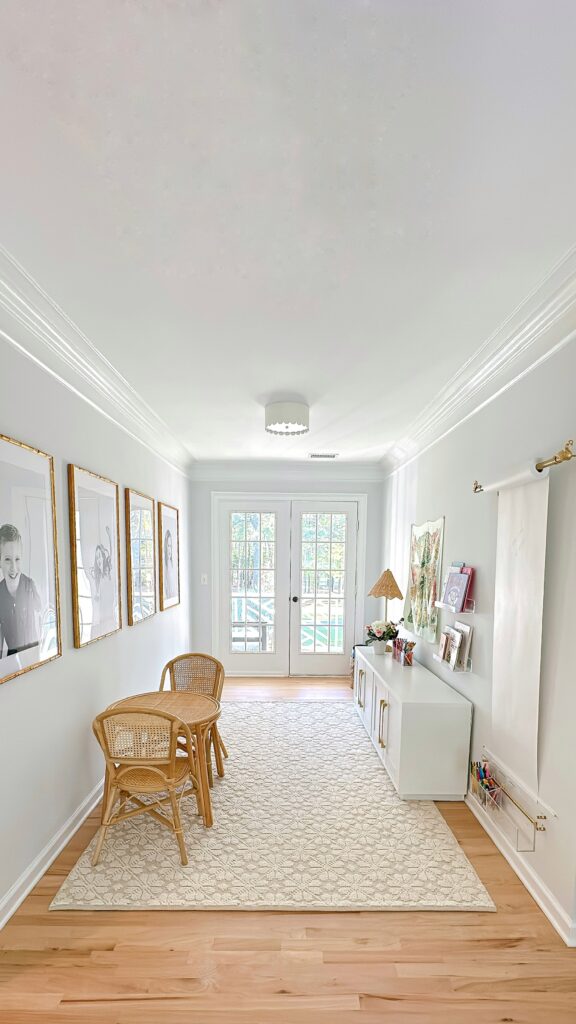
Considerations Before Choosing Wooden Floors For Your Kitchen
Before choosing wooden floors for your kitchen, there are several important considerations to keep in mind:
Moisture & Water Resistance
Kitchens are high-traffic areas prone to spills and moisture. Ensure the wood flooring you choose is suitable for areas with high humidity and occasional spills. Engineered wood or certain types of sealed hardwood can offer better water resistance compared to solid hardwood.
Durability
Select a wood species known for its durability and hardness, such as oak, maple, or hickory, to ensure the flooring can withstand the wear and tear of a kitchen environment.
Maintenance
Consider the maintenance requirements of the wood flooring. Some types of wood may require regular sealing or refinishing to maintain their appearance and protect against moisture damage. You’ll need to take care when using cleaning products on certain wood floors to ensure you do not ruin the finish
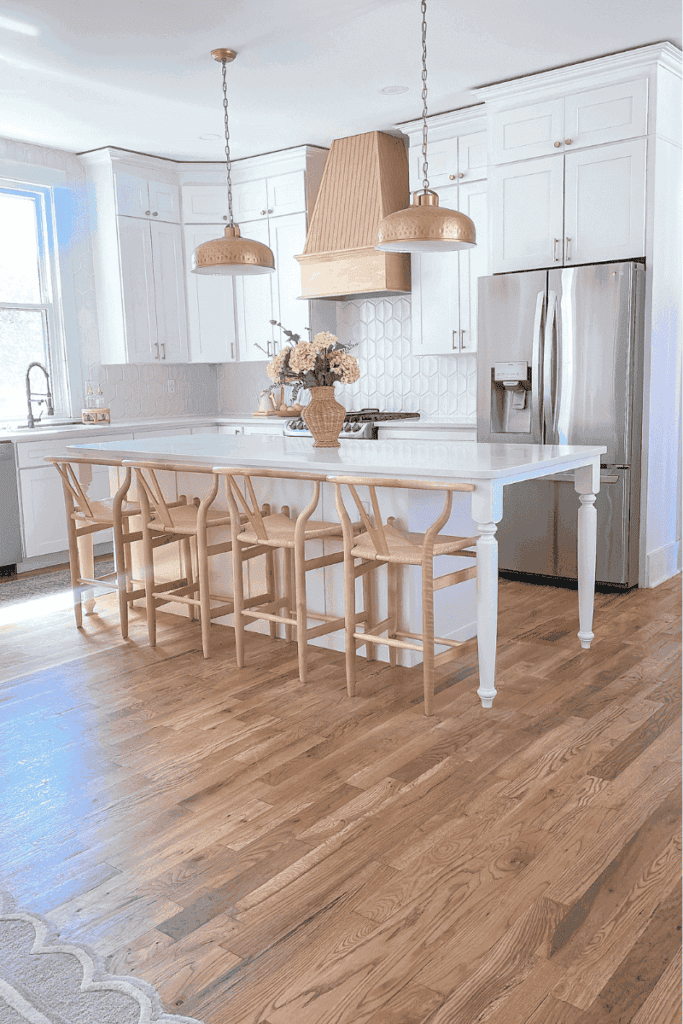
Style & Design
Choose a wood flooring option that complements the style and design of your kitchen. Consider the color, grain pattern, and plank width to ensure the flooring enhances the overall aesthetic of the space.
Budget
Wooden flooring can vary significantly in price depending on the type of wood, quality, and installation costs. Set a budget and explore different options to find a balance between quality and affordability.
Installation
Determine whether you will hire professionals for installation or opt for a DIY approach. Some types of wood flooring may be easier to install than others, so consider your skill level and the complexity of the installation process.
Long-Term Considerations
Think about the long-term impact of your choice. Consider how the wood flooring will age over time, how it will affect the resale value of your home, and whether it aligns with your lifestyle and maintenance preferences.
Types Of Wood Floors For Your Kitchen
There are several different types of wood floors for your kitchen. Depending on your family’s lifestyle and needs, the best wood floors for your kitchen will be clear.
To find out more about the different types of wood floors, check out the differences below:
Solid Hardwood Flooring
Solid hardwood flooring is the best choice for those looking for a traditional and luxurious feel. Options like white oak or other harder woods can make solid hardwood floors an excellent choice for kitchens with less risk of water damage.
What We Love About It
Solid hardwood flooring is a popular choice for kitchens due to its timeless beauty, natural warmth, and potential to increase the value of a home. T
he pros include its durability and longevity, as solid hardwood can be refinished multiple times to restore its original luster and beauty, making it a long-term investment. Additionally, solid hardwood provides a luxurious and high-end look that can elevate the aesthetic appeal of a kitchen.
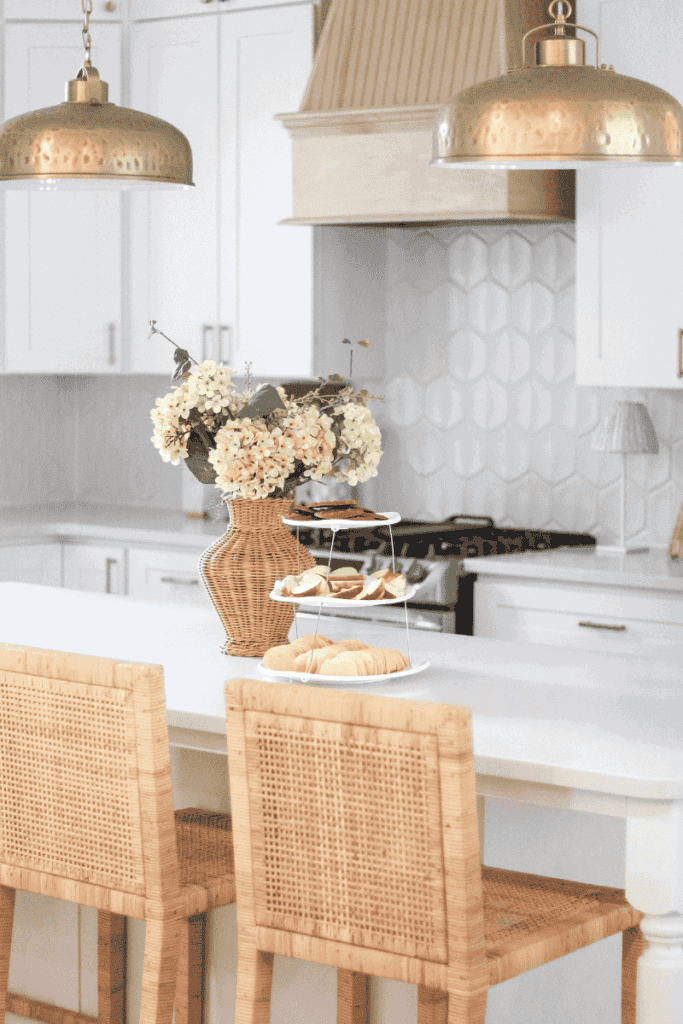
What Could Be Better
The drawbacks of using solid hardwood in the kitchen include its susceptibility to moisture damage, which can lead to warping, cupping, or staining if spills are not promptly cleaned up.
Solid hardwood is also more sensitive to temperature and humidity fluctuations than engineered wood, which can result in expansion or contraction of the wood planks over time. If you live in a location that experiences extreme temperature highs and lows, you may note these changes.
Furthermore, solid hardwood tends to be more expensive than engineered wood and may require professional installation, adding to the overall cost.
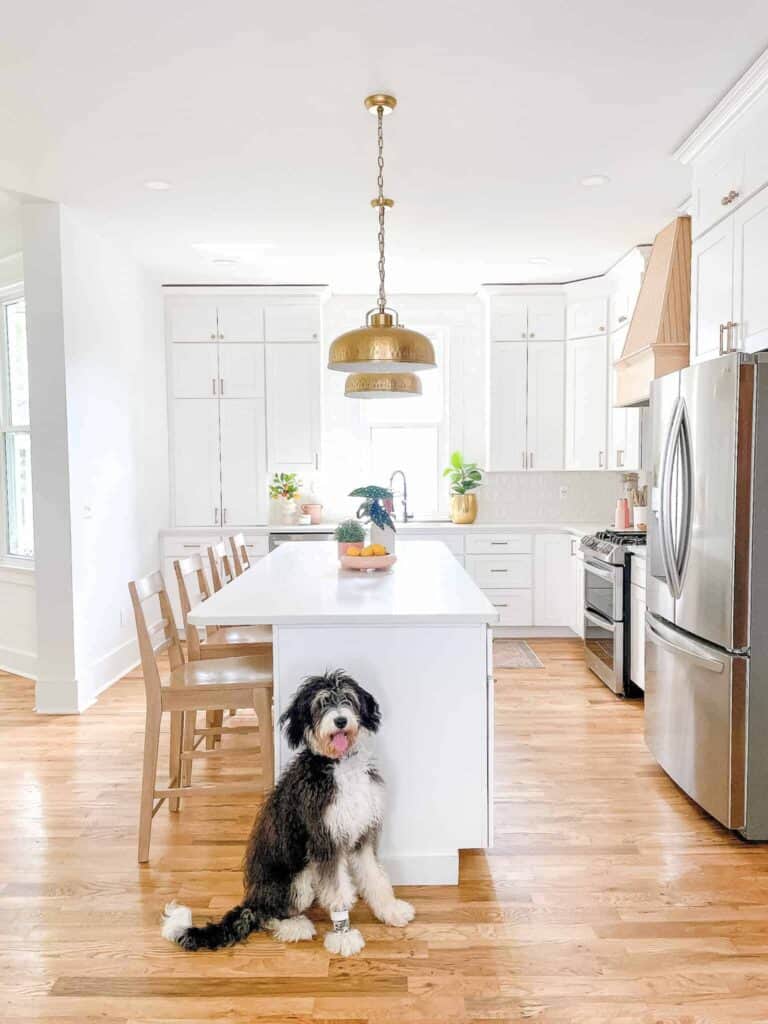
Engineered Wooden Floor
Engineered wood floors have a real hardwood veneer over a plywood core. This makes them a good option for kitchens due to their stability and compatibility with underfloor heating.
What We Love About It
Engineered wood flooring can be a great choice for kitchen flooring due to its durability, versatility, and aesthetic appeal.
The pros include its ability to withstand moisture and temperature fluctuations better than solid hardwood, making it less prone to warping or cupping in a kitchen environment where spills and humidity are common.
Engineered wood is also typically more cost-effective than solid wood and can be installed over various subfloor types, including concrete. Additionally, engineered wood flooring offers a wide range of styles and finishes to suit different kitchen designs.
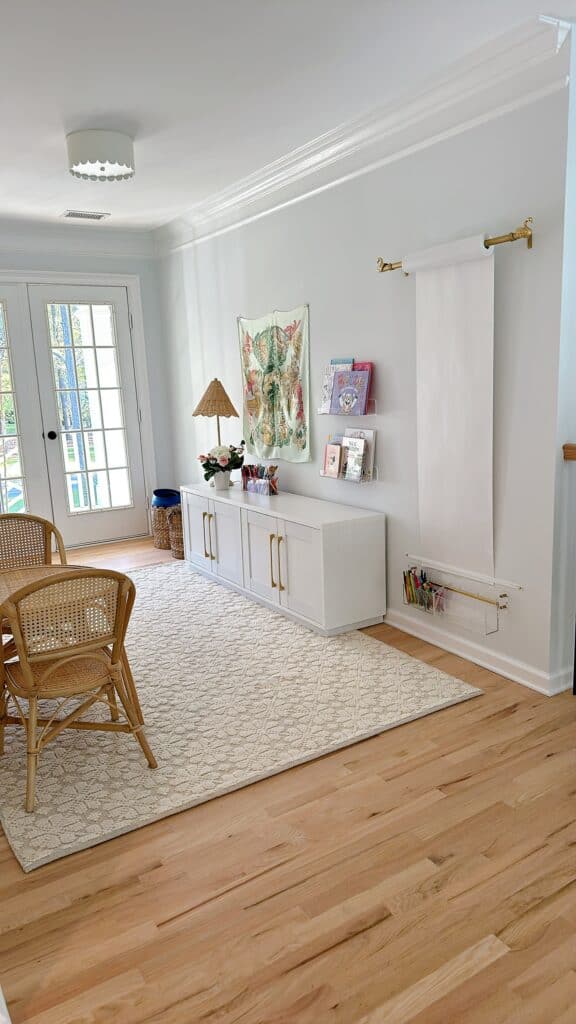
What Could Be Better
The drawbacks of using engineered wood in the kitchen include the potential for scratches and dents over time, especially in high-traffic areas.
While engineered wood is more water-resistant than solid wood, excessive moisture exposure can still cause damage.
Laminate Flooring
A more budget-friendly option, laminate flooring can mimic the look of real hardwood. It’s a good choice for those who want the wooden look without the cost of solid wood floors.
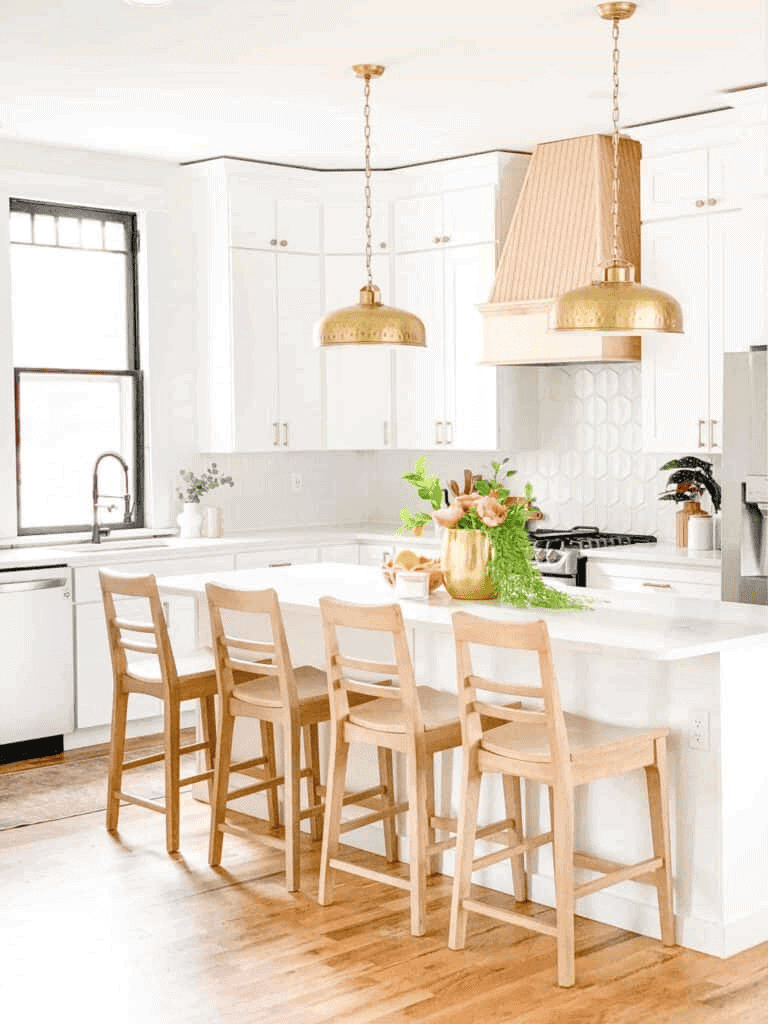
What We Love About It
Laminate flooring is a popular choice for kitchens due to its affordability, easy maintenance, and wide variety of styles.
The pros of laminate flooring in the kitchen include its durability against scratches, stains, and fading. This makes it a practical option for high-traffic areas.
Laminate is also easy to clean and resistant to moisture when properly installed, providing a low-maintenance flooring solution.
What Could Be Better
Laminate flooring can be prone to water damage if exposed to excessive moisture, such as spills left unattended.
Additionally, while modern laminate can closely resemble the look of hardwood or stone, it may lack the warmth and authenticity of real wood or tile, potentially impacting the overall aesthetic of the kitchen.
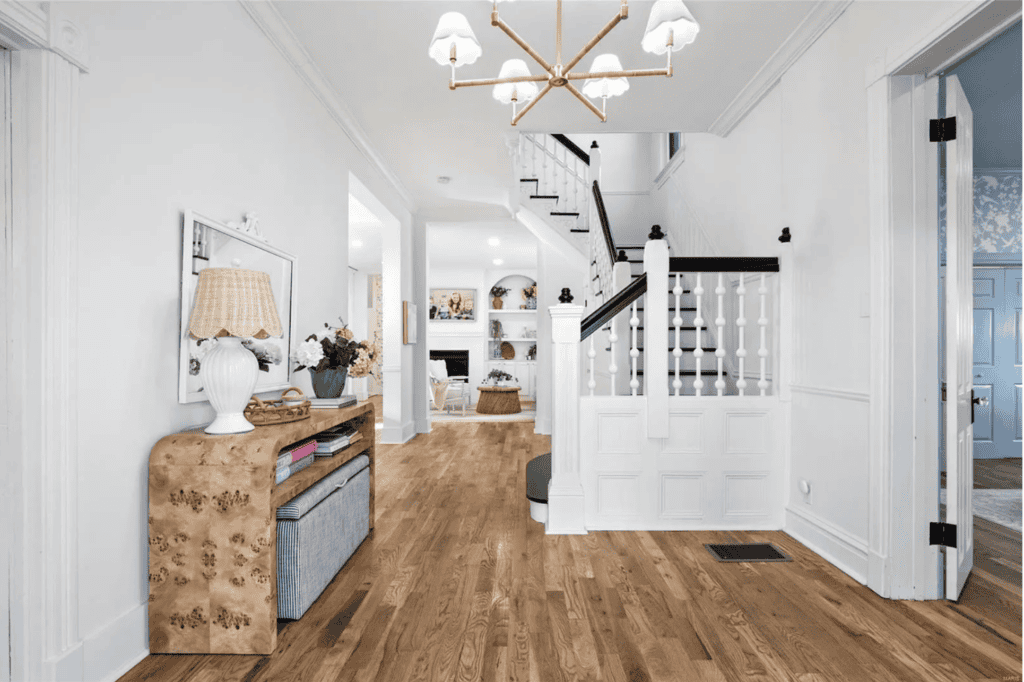
Luxury Vinyl Plank (LVP) & Luxury Vinyl Tile (LVT)
Both LVP and LVT are fantastic options if you’re looking for wooden flooring with a bit more protection against scratches, dings, and water damage.
They offer the wood-look flooring with added durability, making them a popular option for busy kitchens.
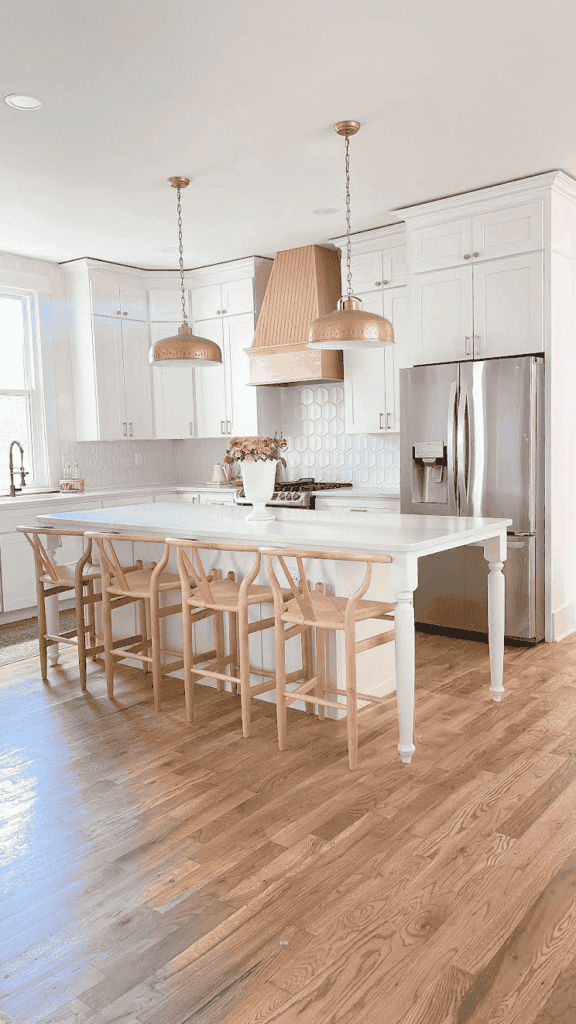
What We Love About It
Luxury vinyl plank (LVP) and luxury vinyl tile (LVT) are popular choices for kitchen flooring due to their durability, water resistance, easy maintenance, and versatility in design.
The pros include their ability to mimic the look of natural materials like hardwood, stone, or tile at a more affordable price point. This makes them a cost-effective option for homeowners seeking a high-end aesthetic.
LVP and LVT are also highly durable, resistant to scratches, stains, and water damage. They are ideal for busy kitchen environments where spills and heavy foot traffic are common.
Additionally, these types of flooring are relatively easy to install as they often come in interlocking or adhesive forms, allowing for a DIY-friendly installation process.
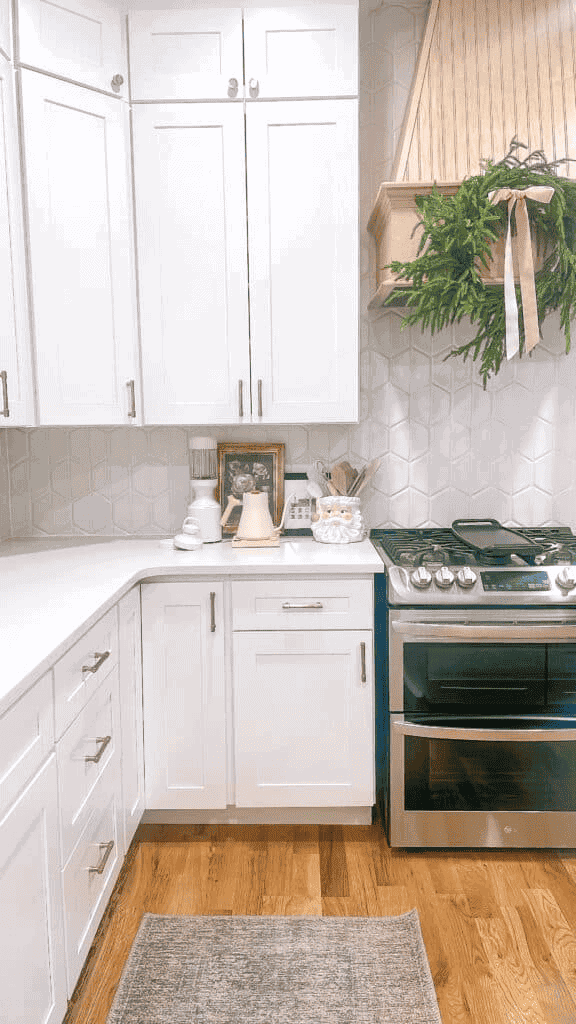
What Could Be Better
While LVP and LVT are durable, they can still be susceptible to fading or damage from direct sunlight over time.
Additionally, although they provide a realistic look, some may find that the texture and feel of vinyl flooring do not match the authentic feel of natural materials like hardwood or stone.
Shop My Favorite Rugs For Your Kitchen
If you are looking for new rugs to warm up those hardwood floors, check out my favorite rugs for your kitchen:
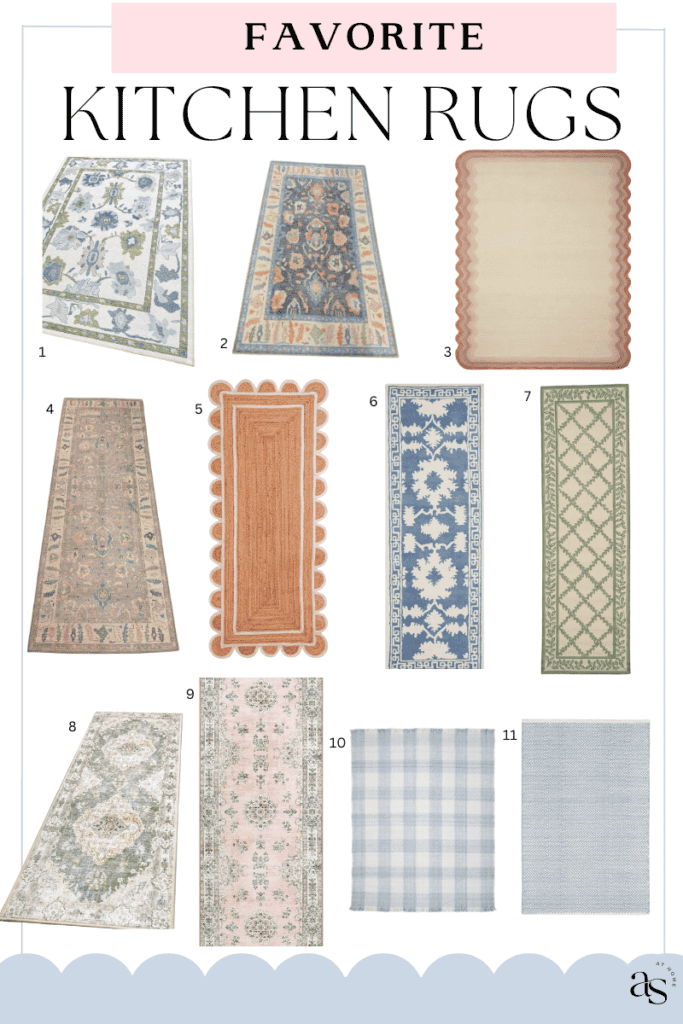
1 | 2 | 3 | 4 | 5 | 6 | 7 | 8 | 9 | 10 | 11
Green Oushak Rug
Modern Oushak Rug
ustina Blakeney x Loloi Buena Onda Collection
Modern Oushak Runner Rug
Area Rug Natural Jute
SAFAVIEH Bella Collection
SAFAVIEH Chelsea Collection Runner
Runner Rug Machine Washable
Lahome Pink Runner Rug
Gingham Rug
Dash and Albert Herringbone Accent Rug
Other Posts You’ll Love
Best Steam Mop For Tile Floors | How To Paint Tile Floors | Mudroom Tile Ideas
Pin The Photo Below For Later
When selecting the best flooring options for your kitchen, personal preference will play a significant role.
Whether you’re drawn to the warmth and classic appeal of solid wood floors or the water resistance and durability of luxury vinyl flooring, your choice of kitchen flooring should align with your lifestyle, environmental impact concerns, and the aesthetic of your home.
Overall, the best wood floors for your kitchen will depend on how you use the space, your design style, and your budget.
Whether you settle for the timeless elegance of solid hardwood flooring, the practicality of engineered wood, or the innovation of luxury vinyl products, make sure it’s a type that will keep your kitchen in great condition for years to come.
Your kitchen can set the stage for cherished memories, so choose wisely—and enjoy the new floor under your feet!

